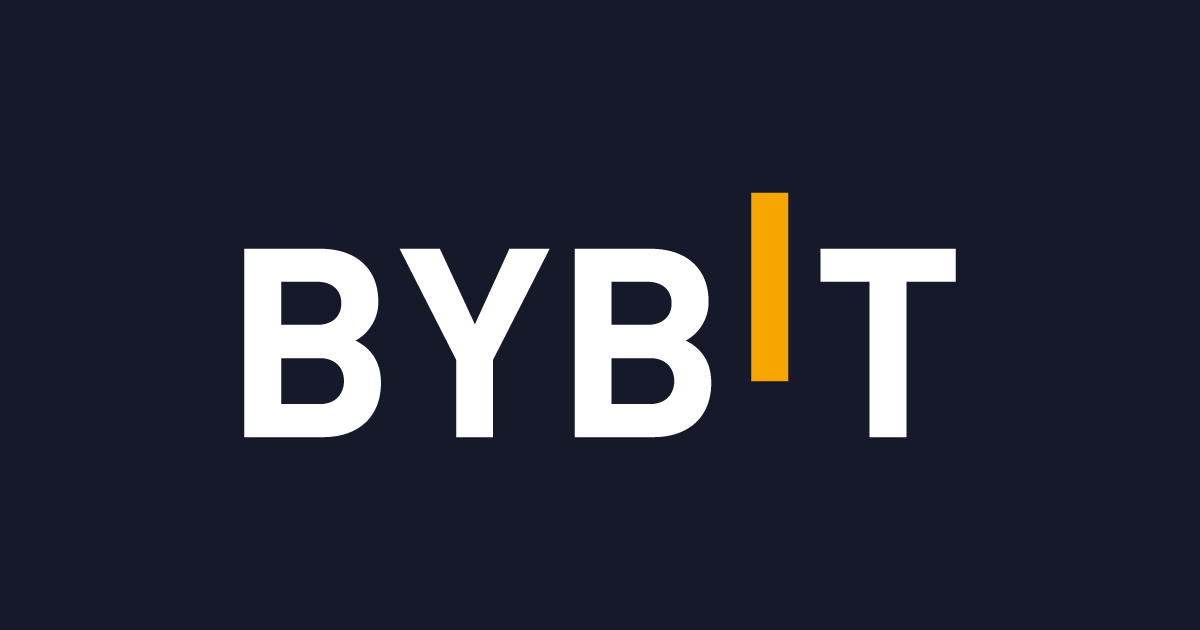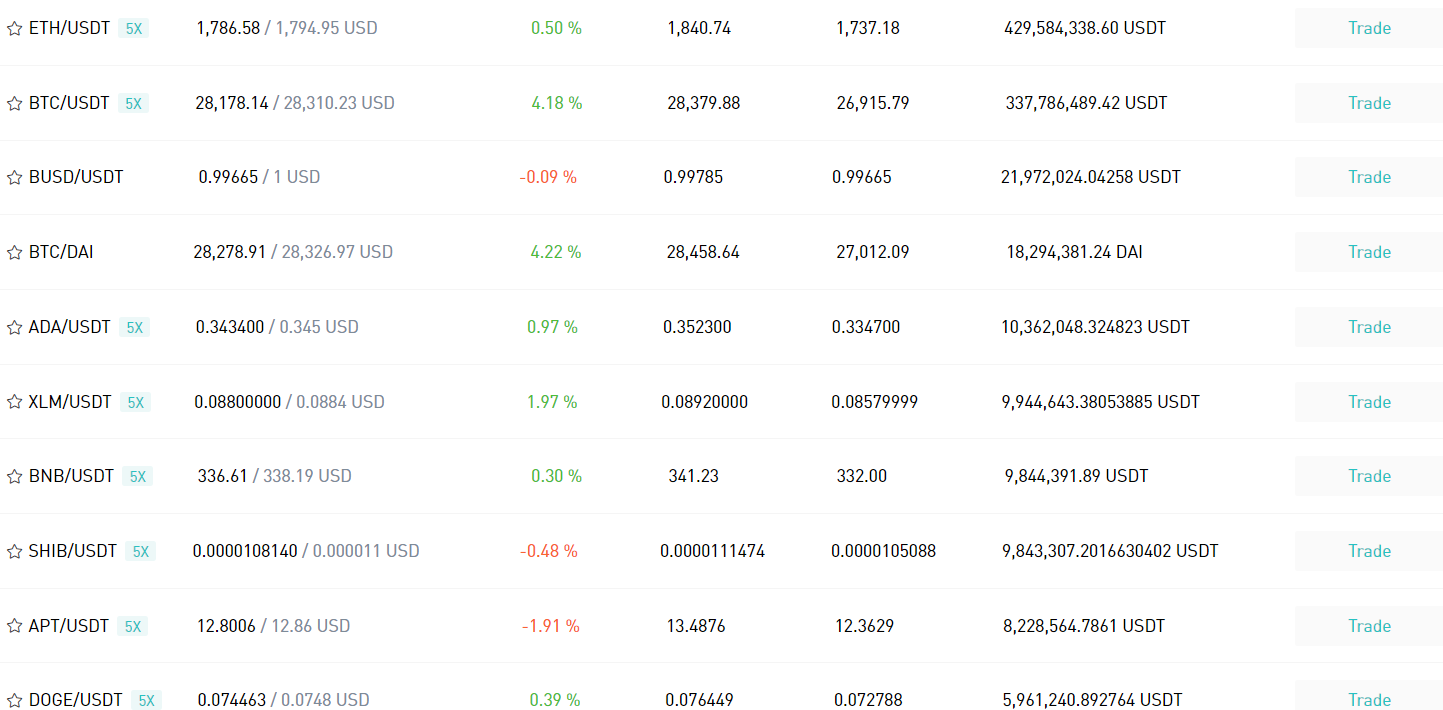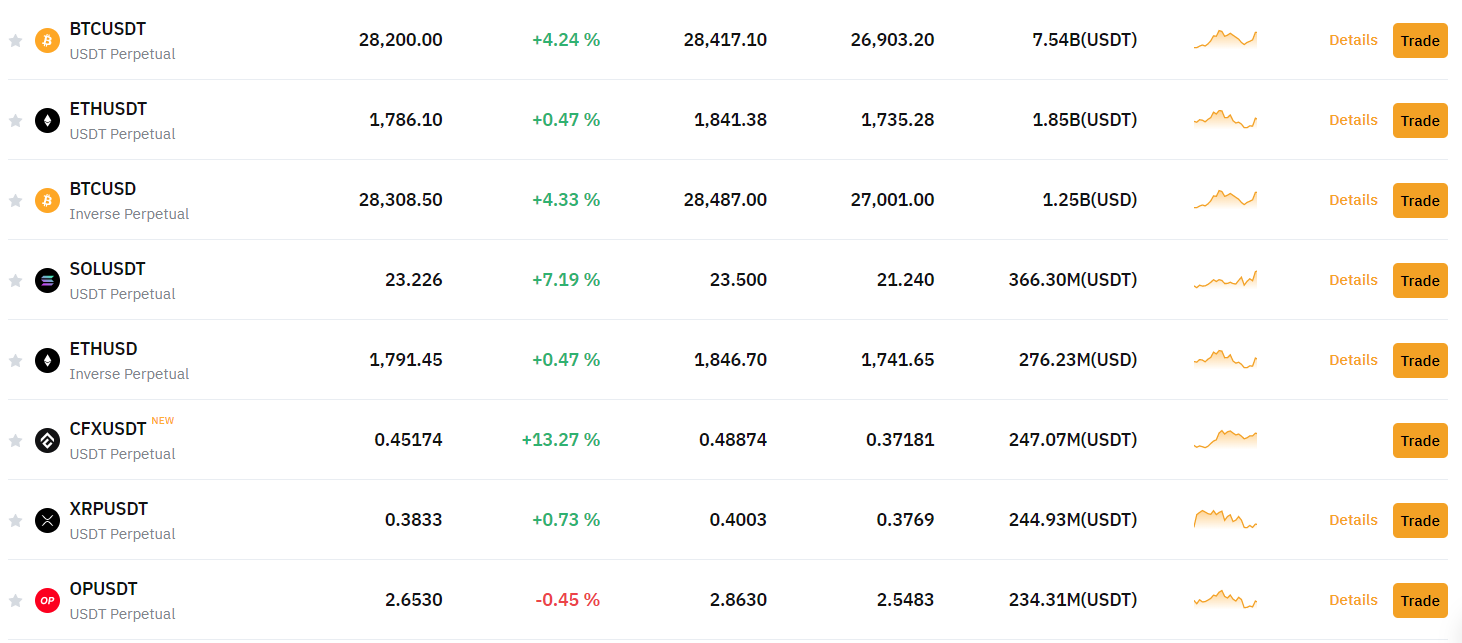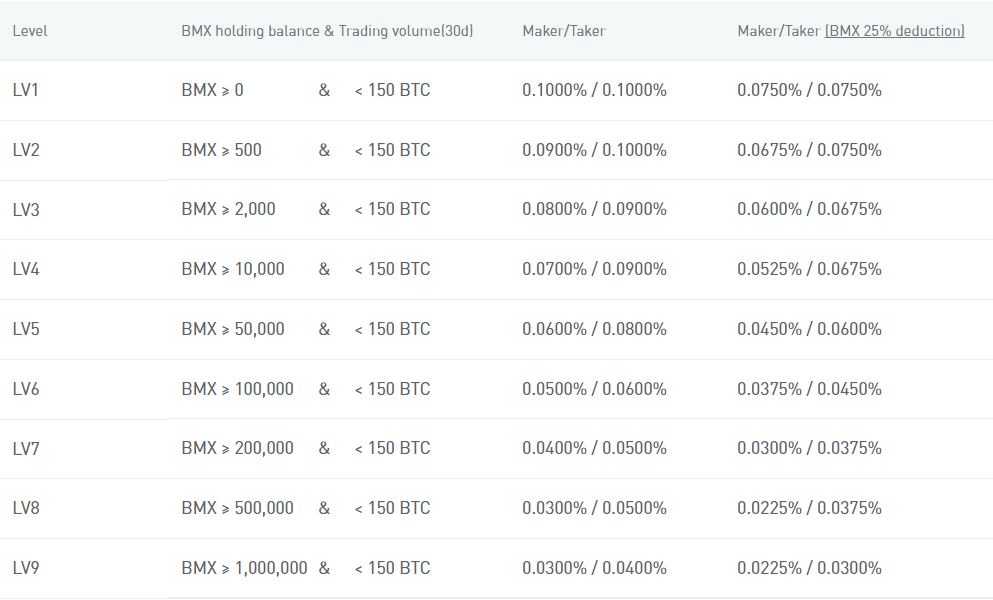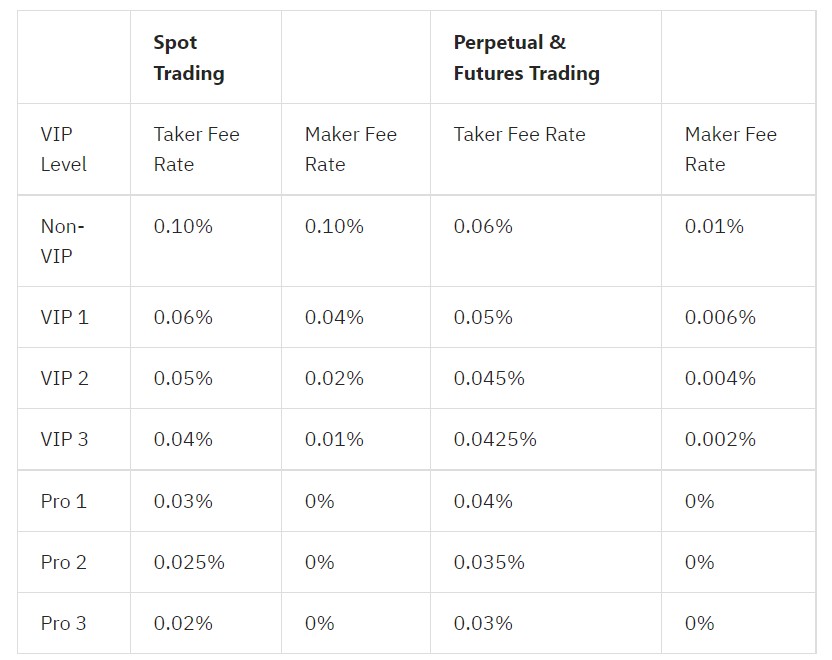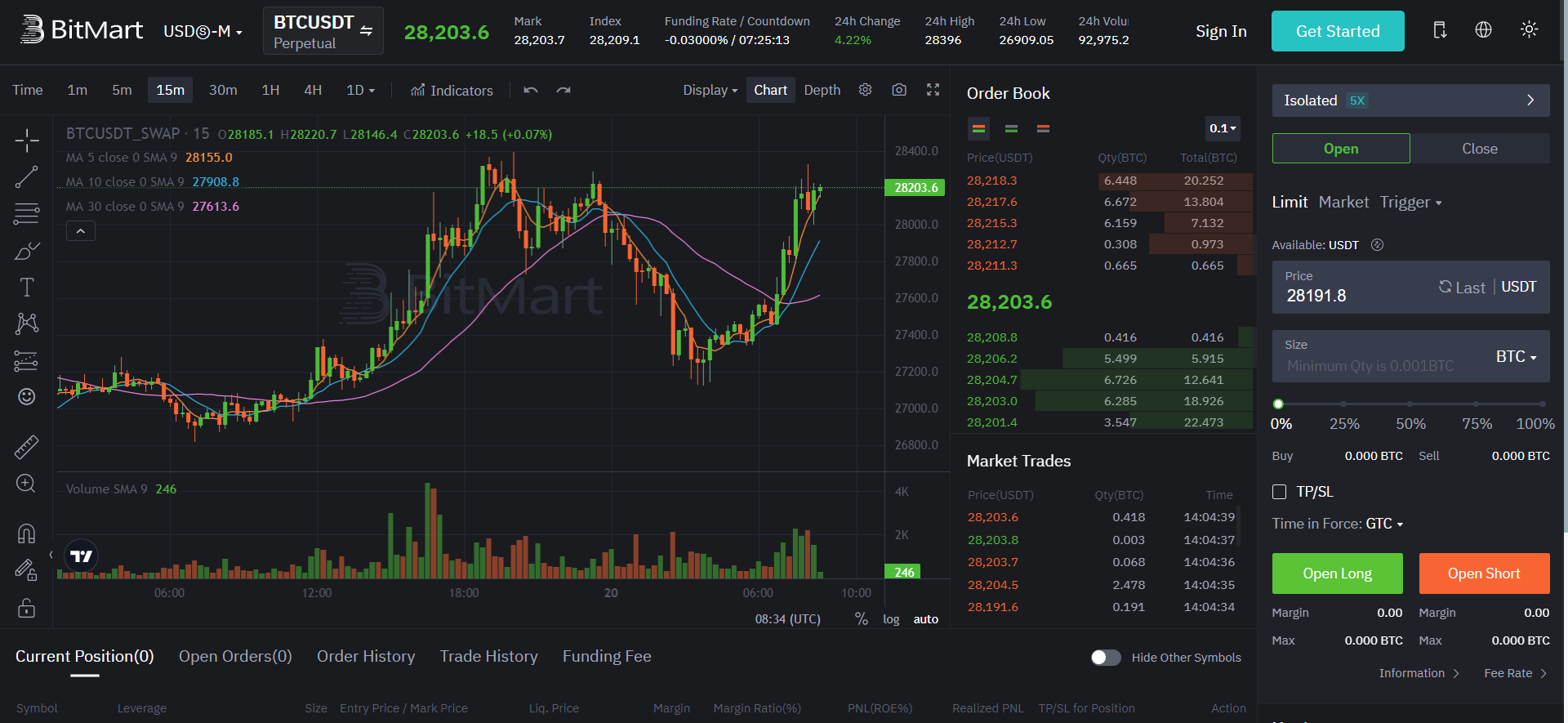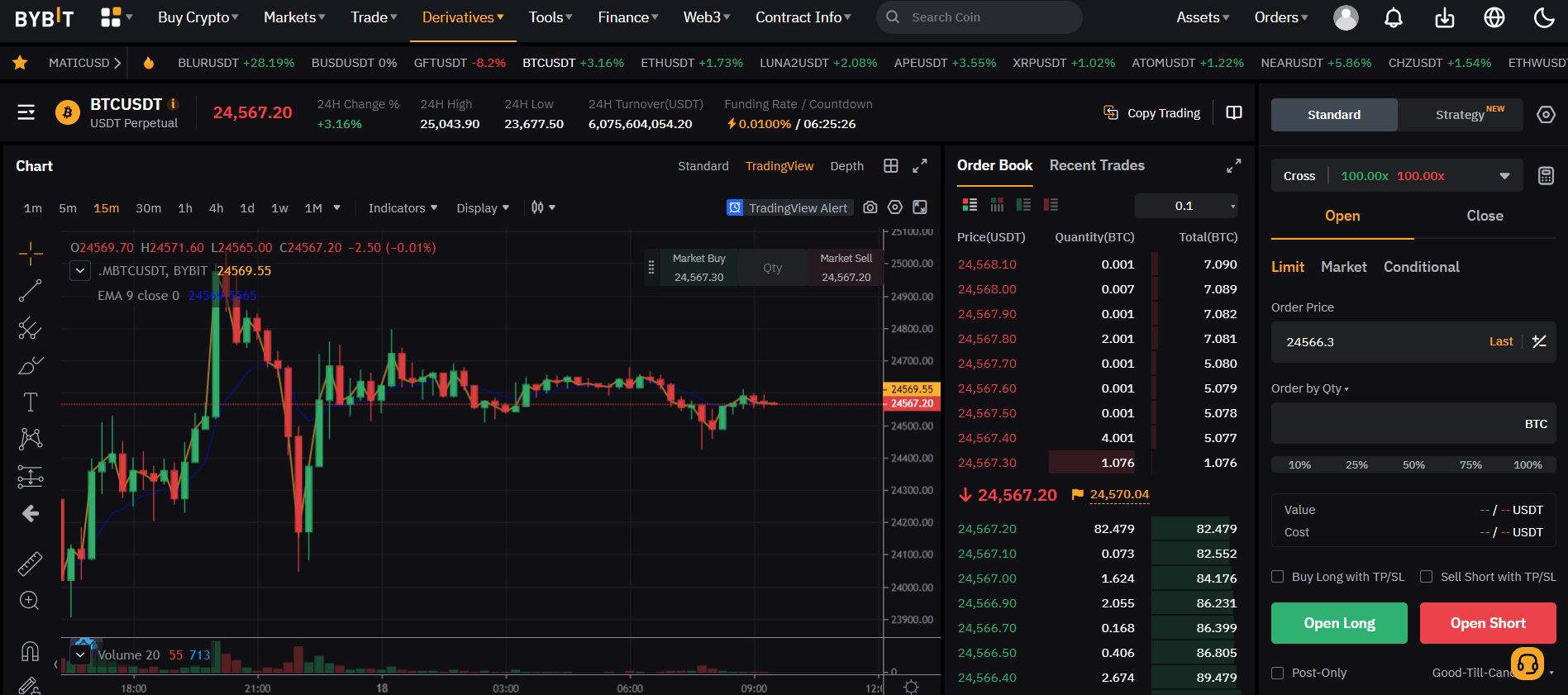Bitmart and Bybit are two popular exchanges in the cryptocurrency market, and both offer a wide range of trading options for various cryptocurrencies.
In this article, I will compare the fees, security, user experience, supported coins, and more for both exchanges.
Whether you’re an experienced trader or new to the cryptocurrency world, this guide will provide you with everything you need to know to make an informed decision on which exchange is best suited for your day trading needs.
Bitmart vs Bybit: At a Glance comparison
| Features | Bitmart | Bybit |
| Trading Fees | 0.1% for maker and taker Spot trades, and 0.02%/0.06% for Futures trades | 0.1% for maker and taker Spot orders, and 0.01%/0.06% for Futures orders |
| Highest Leverage | Offers up to 100x for Futures trading. | Offers up to 100x for Perpetual contracts on Futures trading. |
| Mobile App | Available for iOS and Android | Available for iOS and Android |
| Security | Two-factor authentication, SSL encryption, and cold storage | Two-factor authentication, SSL encryption, and cold storage |
| Customer Support | 24/7 customer support via live chat and email | 24/7 customer support via live chat and email |
| Trading Tools | Advanced trading tools including margin trading, stop loss, and take profit orders | Advanced trading tools including margin trading, stop loss, and take profit orders |
Bitmart vs Bybit: Trading Markets, Products & Leverage Offered
| Criteria | Bitmart | Bybit |
| Trading markets | Spot, margin, futures | Spot, inverse perpetual, futures |
| Supported coins | 170+ coins including BTC, ETH, XRP | BTC, ETH, XRP, EOS and others |
| Products | Offers spot trading, margin trading, and futures trading. | Offers spot trading, perpetual contracts, and futures trading. |
| Leverage Offered | Offers leverage of up to 100x for futures trading. | Offers maximum leverage of up to 100x for Bitcoin Perpetual contracts. |
| Minimum Deposit | Bitmart requires a minimum deposit of $10. | Bybit requires a minimum deposit of 0.0005 BTC. |
Overall, Bitmart offers a wider range of trading markets and products, but Bybit offers competitive fees and leverage options. Also, with ByBit, you are getting a referral bonus when you use ByBit’s promo code.
Overall, both platforms offer robust security features and mobile apps for convenient trading on the go.
Bitmart vs Bybit: Supported Cryptocurrencies
Bitmart supports over 200 cryptocurrencies, including
- Bitcoin
- Ethereum
- Ripple
- Litecoin
- Tether
It also supports many lesser-known tokens, such as
- Dero
- Phore
- Utrum
Bybit, on the other hand, is primarily a derivatives exchange, which means that it focuses on trading futures contracts and perpetual swaps for cryptocurrencies.
Currently, Bybit supports trading for
- Bitcoin (BTC)
- Ethereum (ETH)
- Ripple (XRP)
- EOS
- Bitcoin Cash (BCH)
While Bitmart has a broader range of supported cryptocurrencies, Bybit’s focus on futures trading for a select group of popular coins may appeal to traders who prefer to concentrate on a smaller number of assets.
Bitmart vs Bybit: Trading Fee & Deposit/Withdrawal Fee Compared
Bitmart charges a flat 0.1% trading fee for both makers and takers in Spot orders. This fee can be reduced further if you hold Bitmart’s native token, BMX, or if you achieve a certain trading volume.
There is a flat fee of 0.02%/0.06% on any Futures orders with the same Maker/Taker fee model.
Bitmart also charges a withdrawal fee for each cryptocurrency. For example, the withdrawal fee for Bitcoin is 0.0005 BTC, while the withdrawal fee for Ethereum is 0.01 ETH.
Bybit’s Spot trading fees are based on a maker-taker fee structure, which ranges from 0.1% to 0% for makers and 0.1% to 0.02% for takers.
The fees decrease as users increase their trading volume, and there are additional discounts available for traders who hold Bybit’s native token, BYT.
For Futures orders on Bybit, you can be charged trading fees in a range of 0.01%-0% (maker) and 0.06%-0.03% depending on your VIP level with the exchange.
Bybit charges a flat withdrawal fee for each cryptocurrency, which varies depending on the token. For example, the withdrawal fee for Bitcoin is 0.0005 BTC, while the withdrawal fee for Ethereum is 0.01 ETH.
In terms of deposits, both Bitmart and Bybit do not charge any fees for depositing cryptocurrencies. However, users may incur network fees when transferring digital assets to their wallets.
Verdict: Bybit is the clear winner in this case, as both the Spot and Futures trading fees are the same or lower than the ones offered by Bitmart.
Bitmart vs Bybit: Order Types
Bitmart and Bybit both offer different types of orders to help traders achieve their goals.
Bitmart offers the following order types:
- Limit orders
- Market orders
- Stop-loss orders
- Stop-limit orders
Bybit offers the following order types:
- Market orders
- Limit orders
- Conditional orders
- Stop-loss orders
- Take-profit orders
- Trailing-stop orders.
Overall, both Bitmart and Bybit offer a range of order types to suit the needs of different traders.
Verdict: Bybit is the winner here as it offers more advanced conditional orders, such as take-profit and trailing-stop orders along with the basic types of orders offered by Bitmart.
Bitmart vs Bybit: KYC Requirements & KYC Limits
Bitmart requires you to complete KYC verification to access its full range of features. The verification process involves submitting personal information, including government-issued identification and in some cases, a selfie.
Once the verification process is complete, you can trade and withdraw up to $1 million worth of cryptocurrencies daily.
However, Bitmart may require additional documentation and verification for users who want to increase their limits.
Bybit also requires users to complete KYC verification before trading or withdrawing cryptocurrencies. Verification involves submitting personal information, including government-issued identification and proof of address.
Once the verification process is complete, users can trade and withdraw up to 100 BTC per day, depending on their trading volume and account level.
Verdict: This is a tie as both platforms have KYC requirements that are similar.
Bitmart vs Bybit: Deposits & Withdrawal Options
Bitmart allows users to deposit and withdraw cryptocurrencies only.
Bitmart supports a wide range of cryptocurrencies, including Bitcoin, Ethereum, Litecoin, and Ripple. Withdrawals are also limited to cryptocurrencies and can be made to any external wallet.
Bybit allows users to deposit fiat currency to trade on the exchange and withdraw. Users can deposit funds by transferring cryptocurrencies from their wallets to their Bybit accounts. Withdrawals can be made to any external wallet.
Verdict: Bybit is the clear winner here as you can use fiat currency to trade on the exchange, whereas Bitmart offers a limited range of deposit and withdrawal options, which may be a downside for users looking for more diverse options such as bank transfers or credit/debit card payments.
Bitmart vs Bybit: Trading & Platform Experience Comparison
Bitmart’s trading platform offers a user-friendly interface that is easy to navigate, making it suitable for beginner and experienced traders. The platform provides advanced trading tools, such as technical analysis indicators, price alerts, and a depth chart.
Additionally, Bitmart offers a mobile app that allows users to trade cryptocurrencies on the go. However, the mobile app lacks some of the advanced features available on the web-based platform.
Bybit’s trading platform is also user-friendly, with a clean and intuitive interface. The platform provides advanced trading features and a mobile app, making it a suitable choice for traders who prefer to trade on their smartphones. To know more about ByBit’s trading, check out this ByBit tutorial.
Verdict: Our winner is Bybit for its superior mobile application experience, but depending on what you are looking for, Bitmart’s “copy trade” feature is a unique addition that can be particularly helpful for beginner traders.
Bitmart vs Bybit: Customer Support
Bitmart provides customer support via email, live chat, and phone. The support team is available 24/7, making it easy for users to get assistance whenever they need it.
Additionally, Bitmart has an extensive knowledge base that provides answers to commonly asked questions.
Bybit provides customer support via email and live chat, but unlike Bitmart, it does not offer phone support. However, Bybit’s customer support team is available 24/7 and is known for its fast response times.
Additionally, Bybit has an active social media presence, making it easy for users to get in touch with the support team through platforms like Twitter and Telegram.
Verdict: Bitmart’s phone support and extensive knowledge base give it an edge for users who prefer to speak directly with a support representative or find answers to their questions independently.
Bitmart vs Bybit: Security Features
Bitmart takes security seriously and uses a combination of industry-standard security measures to protect user funds and personal information.
The exchange stores the majority of user funds in cold storage.
Additionally, Bitmart uses two-factor authentication (2FA) and email verification for logins and withdrawals. Bitmart also employs regular security audits to ensure the safety of the platform.
Bybit also stores the majority of user funds in cold storage and uses multi-signature technology to protect against unauthorized access.
Bybit also employs two-factor authentication (2FA) and email verification for logins and withdrawals.
It is worth noting that both exchanges have been subject to hacking attempts in the past, highlighting the need for you to enable all available security measures, such as 2FA, to safeguard your accounts further.
Verdict: Both exchanges have taken their fair share of security measures to make sure user funds are secure on their platform.
Is Bitmart Safe & Legal To Use?
In terms of safety, and as mentioned earlier, the exchange stores the majority of user funds in cold storage, uses multi-factor authentication for logins and withdrawals and regularly conducts security audits.
As for legality, Bitmart is a regulated cryptocurrency exchange that operates under the laws and regulations of the jurisdictions in which it is.
The exchange is registered with the U.S. Financial Crimes Enforcement Network (FinCEN) as a money services business (MSB) and complies with anti-money laundering (AML) and know-your-customer (KYC) requirements.
They are also registered with the Australian Transaction Reports and Analysis Centre (AUSTRAC) as a digital currency exchange provider.
Overall, yes, Bitmart is a safe and legal cryptocurrency exchange that prioritizes security and compliance with regulations.
Is Bybit Safe & Legal To Use?
The majority of user funds at Bybit are stored in cold storage, which is offline and inaccessible to hackers. The exchange has a bug bounty program that rewards users who report any security vulnerabilities in the platform.
Regarding legality, Bybit is a regulated cryptocurrency exchange that complies with the laws and regulations of the jurisdictions in which it operates.
The exchange is registered with the British Virgin Islands Financial Services Commission (BVIFSC) and the Australian Securities and Investments Commission (ASIC).
Bybit also follows anti-money laundering (AML) and know-your-customer (KYC) regulations to prevent illegal activities like money laundering and terrorist financing.
Overall, yes, Bybit is a safe and legal cryptocurrency exchange that prioritizes security and compliance with regulations.
Conclusion
Bitmart has a lower trading fee, while Bybit offers lower withdrawal fees.
In terms of customer support, Bitmart and Bybit offer similar levels of support, although Bybit has a more extensive FAQ section.
Ultimately, the choice between Bitmart and Bybit depends on your trading preferences and priorities. If you prioritize a broad selection of cryptocurrencies and lower trading fees, Bitmart might be the better option for you.
However, if you prefer a more advanced trading experience, lower withdrawal fees, and more order types, then Bybit might be the better choice.
Check out how Bitmart & Bybit compares to other cryptocurrency exchanges:

